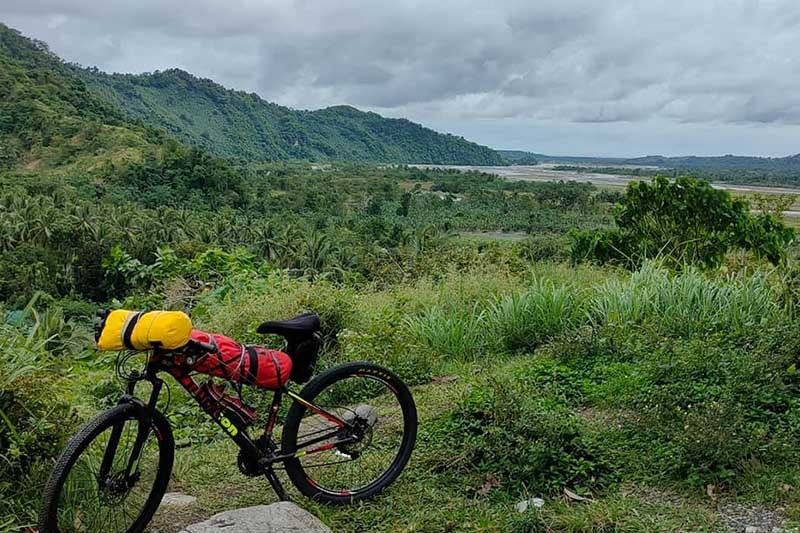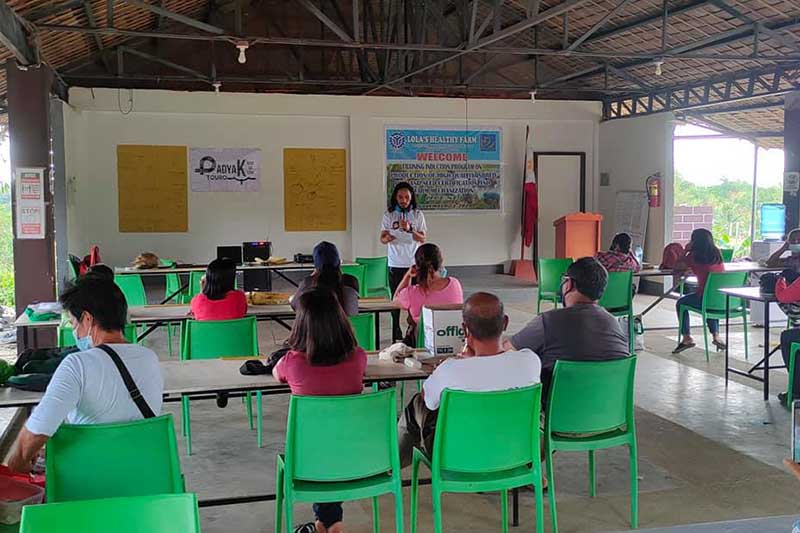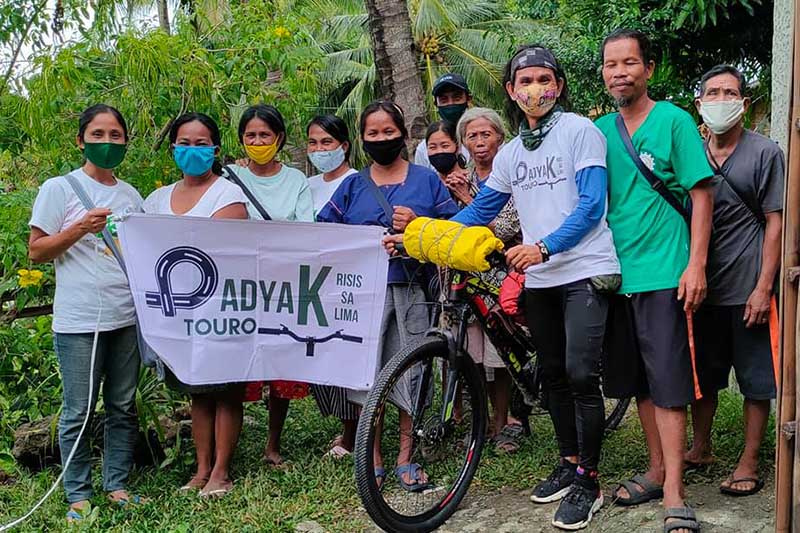As cycling booms, farmer tours Mindoro to teach communities about climate crisis

MANILA, Philippines — At a time when most discussions and campaigns about climate change have shifted online due to pandemic, Jon Sarmiento, a farmer based in Mindoro, has set out on a journey around the island to make people understand the climate crisis and urge them to do something about it.
For half a month, Sarmiento will go around the provinces of Occidental Mindoro and Oriental Mindoro on a bicycle campaign called “Padyak Touro” to teach communities of indigenous Mangyans, fisherfolk, farmers as well as local leaders about the urgency of addressing the climate crisis.
Sarmiento said the impacts of climate crisis such as rising sea level and stronger typhoons are being experienced in Mindoro, an island off the southwestern coast of Luzon.
Residents of the island also deal with frequent flooding events, which destroy farmlands, but many dismiss these as just natural phenomena.
“People don’t understand climate change that’s why their proactive response and mitigations and adaptation mechanisms are not that high, even the government,” he said in an interview with Philstar.com.
Research: Many believe in effect of climate change, few feel informed about it
A research published by the Harvard Humanitarian Initiative last year suggested that seven in 10 Filipinos believed they would be “somehow affected” by the effects of climate change. Concerns over its impacts revolved around health, income loss, damage to agriculture and property and change of livelihoods.
But the same study also found that 60% of the survey respondents said they had not heard of and did not feel well informed about climate change.
Renee Karunungan, a doctoral researcher at Loughborough University, said the failure to mainstream climate change and its links to disasters contributed to the low public awareness. Climate change is also taking a back seat because there are other “everyday realities” that people are facing such as poverty.
An urgent matter

To emphasize that the stakes are high and the issue is urgent to ordinary folks, Sarmiento calls the phenomenon exactly what it is: a crisis, an emergency.
“I stress that this is a climate crisis, a climate emergency so people will understand what are the interventions in case of emergency, what will people do if they’re in a crisis situation,” he said.
During the 15-day tour, Sarmiento will discuss the effects of the climate crisis on farmers, fishers and indigenous peoples—vulnerable sectors to the warming of the world’s temperature.
Sarmiento, who also owns an organic farm called Kuatro Marias in Oriental Mindoro's Victoria town, will teach communities and leaders about climate resilient farming, sustainable food production systems and even sustainable tourism.
“I also share adaptation and mitigation measures. I do not only raise awareness about the problem, I also share best practices to people,” he said.
Environmental organizations have been asking the government to issue a climate emergency declaration to establish a whole-of-government and whole-of-society approach to address the crisis and ensure a rapid transition to renewable energy.
While President Rodrigo Duterte has not declared a climate emergency himself, the House of Representatives passed a resolution last year declaring one. But like most declarations worldwide, it is non-binding.
Born during the pandemic

Sarmiento saw the rise in the number of bikers as an opportunity to do “Padyak Touro.”
“I encourage people to organize and I will go to them.”
“Biker communities in Mindoro also accompany me. I aim to educate them [about the problem] so they can also become carriers of the message of the climate crisis,” he said.
The campaign was also “triggered” when the Philippines dealt with back-to-back strong typhoons late last year while grappling with the coronavirus crisis.
Typhoon Quinta (Molave) cut a path of destruction through Mindoro in late October then, Super Typhoon Rolly (Goni), the world’s strongest storm in 2020, came and pummelled southern Luzon. A week after Rolly, Typhoon Ulysses (Vamco) tore through a vast swath of Luzon.
The three powerful typhoons forced millions to seek refuge in evacuation centers, claimed the lives of at least 125 people and wreaked damage to houses, infrastructure and agriculture totaling billions.
“I go to different barangays, sectors to talk about climate emergency because it seems that nobody is doing this because the focus is on COVID-19. I told them more people will die because of climate emergency, more lives are at risk because of this situation,” Sarmiento said.
In November last year, the International Federation of Red Cross and Red Crescent warned that climate change will have a “more significant medium and long term impact on human life and on Earth” than COVID-19. Hence, the world should address the threats of the climate crisis with the same urgency as fighting the pandemic.
Concrete actions
Aside from educating communities about the climate crisis, Sarmiento is also lobbying for concrete policy actions.
On the local level, they drafted policy actions declaring critical watersheds in Mindoro reserve areas and establishing municipal food councils.
Food councils will be tasked to facilitate access to sustainable and resilient production and marketing resources, ensure availability of adequate and affordable supply in the market, and monitor and act on food loss and food waste.
Sarmiento is also pushing for a “farmers and fisherfolk climate emergency fund” to address the needs of these critical sectors and help them adapt to the changes in agriculture and food production.
- Latest
- Trending






























